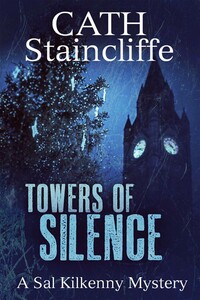Somehow Debbie had got it cracked. I sat opposite her on one of a pair of winged armchairs, drew out my notebook and began my enquiry.
I established her full name, her home situation (divorced, living alone here with three children), her place of work. She was a bit like her house, neat and trim. She was dressed in a fuchsia-pink ribbed sweater and a black skirt. Her hair was dark blonde, pulled into a low bun at the nape of her neck. She wore a little make-up, a silver cross on a chain, silver studs in her ears. ‘Well turned-out’ was the phrase. She looked good but her hands trembled as she spoke and at times she became breathless and stumbled over her words.
I asked her to tell me about the man who had been following her. When had it started?
‘It was about three months ago, just after Easter. I came out of work and he was there across the road. The first couple of times I thought he was waiting to meet someone.’
‘But you noticed him, you were aware of him?’
She played with her chain. ‘He was staring at me longer than you normally do. Then he started to follow me.’
‘From work?’
She nodded. ‘He’d walk behind me, not close but in sight. Follow me to the bus stop. I…it wasn’t…I didn’t like it. One day I went to get Jason’s birthday present,’ she motioned to the photograph, ‘and he was behind me. That’s when it got to me, because I was sure he was actually doing it. There wasn’t any doubt any more.’
‘Was he there every day?’
‘No. Sometimes he’d do two days in a row and then nothing for a few days then he’d turn up again.’
‘No particular pattern?’
She thought for a moment, shook her head.
‘Do you work every day?’
‘No, I do Wednesday, Thursday and Saturdays, sometimes an extra day if one of the girls is sick or there’s stocktaking.’
‘Did you tell anyone at work about it?’
‘Yeah, they all knew. Jean, that’s the manageress, she went and had a word with him a couple of times, asked him to move on. He’d go off but, he’d be there again when I came out, or I’d see him on the way to the bus. It just went on and on.’ Her composure broke. ‘It’s awful,’ she protested, her face crumpling, ‘I keep thinking it must be me, something I’ve said or done. Why is he doing this?’
‘You don’t know him?’
‘No, I’ve no idea who he is.’
‘Does he seem at all familiar? Someone you might have met and forgotten?’
‘No, I’m pretty good with faces. I’ve never seen him, I’m sure.’
‘Has he ever spoken to you, approached you?’
‘Not then but later.’
‘Go on.’
‘About a month after it had all started, I’d had enough. It’s so…’ she paused, finding the right word, running her thumb along the chain and back. ‘It’s creepy, it becomes the most important thing, it gets in the way of everything else.’ She took a breath and exhaled slowly. ‘So, I went up to him, at the bus stop. I told him to leave me alone, to stop following me or I’d report him to the police.’
She swallowed, opened her mouth to speak but couldn’t. She ducked her head. When she did speak, it was a whisper; I strained to catch it. ‘He knew my name.’ She looked up and repeated herself, her voice breaking, high with panic. ‘He knew my name. “Debbie,” he said, that really freaked me out. How did he know my name?’ she cried out.
I waited.
“Don’t be like this,” he said, “you know how much you mean to me.”’ She blushed. ‘It was awful. “I love you,” he said. “You know that.” I couldn’t stand it. I just ran then, to the bus. The next day this letter came, pages and pages of stuff about how much I meant to him and how long he’d waited to find me, on and on.’ She shook her head in disbelief.
‘Have you got the letter?’
‘No, it made me feel dirty. I chucked it. There was no address or anything. It was posted in Manchester.’
‘Was it signed?’
‘Just the initial, G. There’ve been others since. I realised I’d better keep them, for evidence.’ She rose and crossed to a wall cupboard and pulled out a large manila envelope. From inside it she took a bundle of letters. Thick, inky script, closely written. I read two and learned nothing other than that the writer G was obsessed with Debbie, was convinced they would eventually be together and live happily ever after. The language was clichéd and sentimental. I also noticed there was no specific references in them, no mention of other people, of Debbie’s children, no places and nothing that gave any clue to the writer’s identity. It was all generalities like a badly written gift card going on for six pages at a time. The paper and envelopes were cheap – the sort sold at bargain discount outlets.




